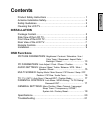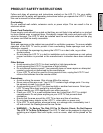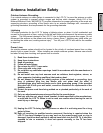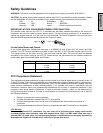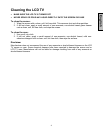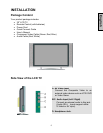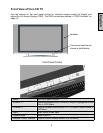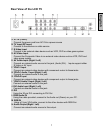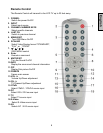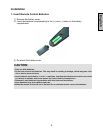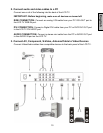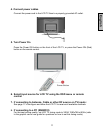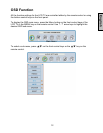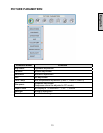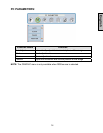
English
2
Antenna Installation Safety
Outdoor Antenna Grounding
If an outside antenna or cable system is connected to the LCD TV, be sure the antenna or cable
system is grounded to prevent voltage surges and built-up static charges. Article 810 of the
National Electrical Code, ANS/NFPA 70, provides information on proper grounding of the mast and
supporting structure, grounding of the lead-in wire to an antenna discharge unit, connection to
grounding electrodes, and requirements for the grounding electrode.
Lightning
For added protection for the LCD TV during a lightning storm, or when it is left unattended and
unused for long periods of time, unplug it from the wall outlet and disconnect the antenna or cable
system. This will prevent damage to the LCD TV due to lightning and power-line surges. Do not
disconnect the antenna or the power cord during a heavy storm – lightning may strike while you
are holding the cable cord, causing serious injury. Turn off your LCD TV and wait for the weather
to improve.
Power Lines
An outside antenna system should not be located in the vicinity of overhead power lines or other
electric light or power circuits. When installing an outside antenna system, extreme care should
be taken to keep from touching such power lines or circuits.
1) Read these instructions.
2) Keep these instructions.
3) Heed all warnings.
4) Follow all instructions.
5) Do not use the LCD TV near water.
6) Clean only with a dry cloth.
7) Do not block any ventilation openings. Install in accordance with the manufacturer’s
instructions.
8) Do not install near any heat sources such as radiators, heat registers, stoves, or
other apparatus (including amplifiers) that produce heat.
9) Do not attempt to bypass the safety purpose of the polarized or grounding- type
plug. A polarized plug has two blades with one wider than the other. A
grounding-type plug has two blades and a third grounding prong. If the provided
plug does not fit into your wall outlet, consult an electrician for replacement of the
obsolete outlet.
10) Protect the power cord from being walked on or pinched particularly at the ends of
the cord.
11) Only use attachments/accessories specified by the manufacturer.
12) Use only with the cart, stand, tripod, bracket, or table specified by the manufacturer,
or sold with the LCD TV. When a cart is used, use caution when moving the cart to
avoid injury or damage.
13) Unplug the LCD TV during lightning storms or when it is not being used for a long
period of time.
14) Refer all servicing to qualified service personnel. Servicing is required when the
LCD TV has been damaged in any way, such as the power-supply cord or plug is
damaged, liquid has been spilled or objects have fallen into the LCD TV, it has been
exposed to rain or moisture, it does not operate normally, or the TV has been
dropped.




